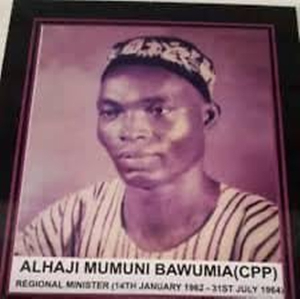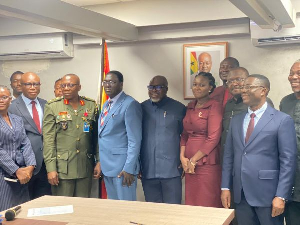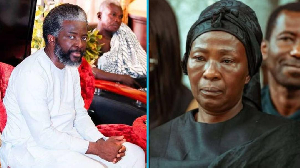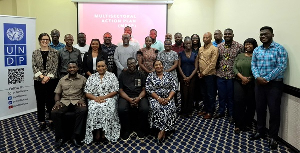PV Obeng’s death, reminded me of my own brush with death at my home in the Washington, DC suburb some time ago. Unlike, PV Obeng, I was not bundled into a taxi and whisked to a hospital. Unlike PV, I had a first class emergency treatment during my health scare.
Unfortunately, in our beloved Ghana, many people die prematurely because of lack of emergency health care. This includes the poor, the rich, the famous and not so famous. Unfortunately, the government and people of Ghana do not learn any lessons from these national tragedies. Since PV Obeng died, what we have seen are, politicization of his death, outlandish propaganda on how one opposition party wants to exploit his death for political gain, demands for the country to accord him a state burial and lengthy eulogies. What is absent is any discourse by our medical community on how to prevent premature asthma deaths. Equally absent from the national discourse is any spotlight on the national disgrace of lack of a nationwide para-medical emergency system. In Ghana, citizens die needless deaths because during the first critical moments of a health episode, resuscitation and stabilization critical for survival are not part of the treatment equation. Those critical minutes require professional care if victims are to survive. Yet in Ghana, we have cab drivers bundling patients into their cabs and speeding off to the nearest hospital. While such efforts are commendable given the sordid state of our emergency care system, they are the worst way to treat health emergencies.
Emergency Care
I survived my health scare because of the superb emergency care I received from my county fire and emergency personnel during those critical moments. No, my wife did not bundle me into one of our cars and drive me to the nearest hospital emergency room. She knew better to call 911, the US emergency call number. In case of any danger, (robbery, violent attack, drowning, health emergency, accidents) it is the number you call. You know somebody will be at the other end and you have that comforting realization that help is on the way. They always respond “911, what’s your emergency? This helps them to allocate resources to your location for your particular emergency. The first responders are well trained professionals. In my case, when the para-medics arrived, they first stabilized me at home and then whisked me to nearest county hospital. There were two ambulances. I was in the second ambulance. The lead ambulance with sirens blaring made sure every car stopped and every traffic light we approached on our way to the emergency room was synchronized green. My wife followed closely in her car behind the second ambulance. Before we arrived at the hospital, the para-medics had prepped me up, tubes for blood and IV and the electrodes for echocardiogram were all ready. The emergency room doctors were notified before we left home by the para-medics to expect me in ten or fifteen minutes. A team of medical personnel had been assembled and were ready for me when we arrived.
Politicians and the sordid state of emergency care in Ghana
So why after nearly sixty years of independence, Ghana still lacks this basic health care? Our politicians never miss a chance to travel overseas to London, Geneva, New York, Paris and Washington, DC. Has it not occurred to them to use the emergency care system of the USA or Britain as a template and create our own Ghanaian model? This is why I fault all our post-independence politicians from Kwame Nkrumah to John Mahama for the sordid state of Ghana’s emergency care system.
The minimum the government can do is train all fire personnel, all commercial drivers (including cab and tro-tro drivers) and gas station attendants, nurses, teachers etc. how to perform cardiopulmonary resuscitation (CPR). It should be a requirement of their jobs. CPR is an emergency procedure for manually preserving brain function until further measures to restore spontaneous blood circulation and breathing in a person who is in cardiac arrest can be accomplished. It is indicated in those who are unresponsive with no breathing or abnormal breathing. Additionally, all fire trucks should be equipped with automated external defibrillator (AED). A heart defibrillator will help restore the natural rhythm of the heart when a person is experiencing dangerous arrhythmia or cardiac arrest. We all have heard stories of citizens presumed dead and bundled into taxis and dumped on morgue floors, only to revive hours later and then unable to get out, eventually freeze to death.
Ghana’s asthma epidemic
Like PV Obeng, I have had asthma since I was a child. If you grew up in Obuasi and its environs during the period when mining pollution was its highest, chances are that you would grow up with a respiratory condition. PV and I are from Adansi. PV and my late dad all hailed from Akrokerri. My late mother hailed from Akrofuom. I did not agree with his political philosophy but nonetheless saddened by his demise. My dad had asthma but he lived to the ripe old age of 95 years. I was first diagnosed with asthma in Ghana by a Jewish physician, Dr. E. K. Wilzek. He was a physician at the then AGC hospital in Obuasi.
I can’t remember the medication I took for my asthma back then. It was a small tablet. Dr. Wilzek told my father that I should never run out of that medicine. In 1968, my father who always maintained contact with Dr. Wilzek, met the physician and he gave him two samples of a new medication called Ventolin. It was an inhaler. He advised my father that we should always carry the inhaler with us everywhere we go. Since then, both my father and I have always had a Ventolin in our pockets. When my father died in 1991 of old age and I returned to Ghana to bury him, I found Ventolin in the pocket of one of his white shorts. Once, I even saved a life with my Ventolin. At the end of a business trip to Arizona, I decided to have some fun riding a horse and corralling cattle in the Arizonian desert. When we boarded our chartered bus on our trip back to our hotel, a teenage girl started having an asthma attack. We were sixty miles away from the nearest hospital. The bus driver called 911 and asked if anybody onboard had an inhaler. Of course I had mine. I gave it to the girl and she took a few puffs and she was stabilized. We met the emergency personnel thirty minutes later and they took over her treatment. I still carry Ventolin in my pocket but I rarely use because it is not my first line of treatment for my asthma.
Asthma Treatment Today
Today, due to advancements in medicine, a whole new class of medicines are available as the first line of treatment for asthma. These are long acting or long-term control medications. These are taken daily even when you don’t have symptoms. I use mine every day, morning and evening regardless of whether I’m having asthma symptoms. I am not a physician but I’ve read so much about asthma in order to know how to control my asthma. I’ve followed religiously the US Center for Disease Control guidelines for the treatment of asthma.
Asthma Action Plan
If you have asthma, you should have an asthma action plan. An asthma action plan (also called a management plan) is a written plan that you develop with your primary care physician to help control your asthma. Any asthmatic should know what kind of medicines to take and when to take them. The plan describes how to control asthma long term and how to handle worsening asthma condition, or attacks. If your child has asthma, all those who care for him or her should know about the child's asthma action plan. Your child’s caregivers (babysitters and workers at daycare centers and schools) can help your child follow his or her action plan. They will know what to do in case of an emergency.
According to former President Rawlings, PV did not manage his asthma well. However, for all asthmatics in Ghana and their primary care physicians, PV’s death should be a teachable moment. Ignoring your asthma may kill you. If you have asthma, you should work closely with your doctor to come up with a treatment plan. Asthma medications are critical in managing signs and symptoms. Your physician will help track your symptoms and make adjustments to your asthma medications if needed. He will work with you to determine which long acting asthma medication is good for you. Ghanaians are notorious for self-diagnosis and self-medication without consulting a physician. Treating your asthma in a similar fashion might kill you. Asthmatics should always consult their physicians before switching medications.
Ghana’s health emergency action plan
In conclusion, let the current government take the initiative and follow the four points below to create a sustainable, workable and efficient emergency health care system. It will help to mitigate the premature loss of our best and brightest to cardiac arrests and curtail the incessant use of taxi cabs to covey emergency medical patients. The key is resuscitation and stabilization before evacuation.
1) Let’s train all our commercial drivers, (tro-tro, cab, bus) police, fire and medical personnel across the country how to perform CPR. This will not require a foreign exchange component. So it could be started immediately.
2) Create a national para-medical emergency system attached to each fire service unit-by training personnel in the latest emergency technologies and equipping units with ambulances and helicopters with basic and advanced life support systems including automated external defibrillators (AED).
3) Create a national emergency grid and provide to all fire and para-medical emergency units-a list of evacuation routes, nearest well equipped hospitals for a particular emergency including trauma and burn units.
4) Educate the population on how to provide routine first aid treatment including resuscitation and stabilization -until the emergency unit arrives on the scene of an emergency. Educate the general public to stop bundling people into cars and taxis at the first sign of trouble.
We should not use the stale excuse of lack of funds to defer action on this emergency action plan a day longer. Our politicians should all support this endeavor regardless of political affiliation because you will never know when you are going to need emergency service. Today, as we mourn an illustrious and brilliant son, the lessons from his premature death should spur us into action in creating a national emergency system. I’m prepared to assist to bring this to fruition if the government needs help in pulling this off. Believe me, this is doable.
Opinions of Tuesday, 27 May 2014
Columnist: Ennin, Baffour O.














